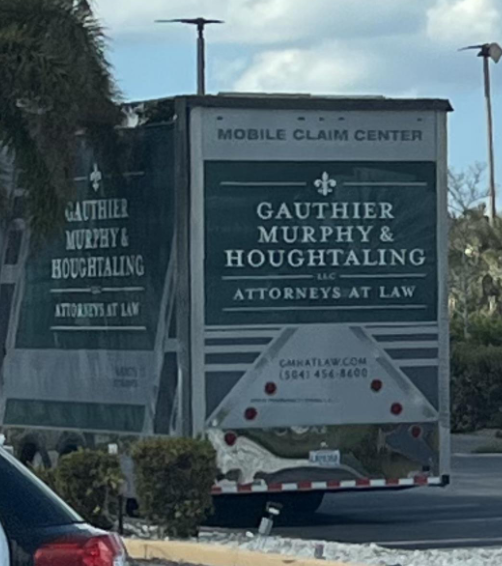Referee faults Florida Bar probe of lawyer accused of improperly soliciting hurricane clients

A referee has determined that lawyer Jennifer Perez didn’t violate ethics rules but concluded that she should be required to take ethics training on lawyer advertising rules. Photos from the Florida Bar's Nov. 17, 2022, petition.
A Florida partner with a Louisiana law firm did not improperly solicit Florida clients after Hurricane Ian and did not attempt to mislead the public about the nature of a truck, a trailer and a tent set up in a parking lot for client meetings, according to a referee in an ethics case.
The referee, Charles Edward Roberts, determined in a July 6 report that lawyer Jennifer Perez didn’t violate ethics rules but concluded that she should be required to take ethics training on lawyer advertising rules.
The referee also criticized the Florida Bar for failing “to do a thorough investigation at the outset.” Roberts said the bar did not pursue “basic investigative inquiries” into the purpose of the trailer and whether hurricane victims walked inside and hired the firm.
The Florida Bar won’t seek review of the report, according to an Aug. 4 letter.
Three lawyers for Perez characterized the referee’s report as a “complete exoneration” in an interview with the ABA Journal.
The bar’s allegations were based on “a horrible misunderstanding,” and Perez “was looking for an opportunity to explain the circumstances,” says Gwen Daniel, one of the lawyers.
The Florida Bar initially sought an emergency suspension of Perez. The bar said the trailer in the parking lot of a closed motel had a tarp covering up the name of Perez’s law firm, apparently to create the impression that the truck was part of the Federal Emergency Management Agency or a state-run site. The words “mobile claim center” were not covered up.
In reality, the referee said, Perez covered up the name of her firm because she feared that it could run afoul of Florida’s attorney advertising regulations. Perez was using the trailer and tent to meet with existing clients, consisting mostly of businesses that had experienced hurricane damage. Clients could also use the trailer and tent to meet with contractors and attend meetings.

No new client was gained through the trailer, which Perez’s firm had initially purchased for trade shows. The trailer had a generator, an air conditioner, bathrooms with running water and computer equipment. The firm found it useful to meet with its commercial clients in the trailer following earlier hurricanes in Louisiana.
The referee said the Florida Bar had sought the emergency suspension without speaking with Perez or anyone else at her firm, Gauthier Murphy & Houghtaling, which is based in Metairie, Louisiana. Perez learned of the bar petition when she received it in her morning mail.
The emergency suspension was in place for only a day before Perez and the bar entered into a stipulation to dissolve it and replace it with an interim probation.
Roberts also said the bar had engaged in discovery violations, but the prejudice was not significant and he would not impose sanctions.
In a June 5 motion, Perez said the violation was a failure to disclose communications by an insurance agent with a motive to impugn Perez’s firm. The bar had not made the disclosure because it thought that the communication confidential.
Roberts said the bar should have disclosed that it had confidential information while saying it could not disclose details. The bar agreed about disclosure with a confidentiality objection in an Aug. 4 notice of correction that included an apology.
The referee did conclude, however, that Perez could have been more careful by requiring the “mobile claim center” wording on the trailer to be covered up. In addition, Perez’s firm should have stated on its website that Florida meetings were available only by appointment, he said.
But the referee found that there was no rule violation because the bar didn’t show a deliberate or knowing rule violation.
Another lawyer representing Perez, Scott Tozian, told the Journal that he was pleased with the referee’s exoneration of his client, but the initial emergency suspension and charges are “still out there in cyberspace.”
“A tremendous amount of negative publicity sprung from the bar seeking that suspension, and I don’t know how you erase that stain,” Tozian says.
The Florida Supreme Court has the option of accepting or disagreeing with the referee’s recommendation, even though the bar is not opposing the report, according to Tozian.
On occasion, the Florida Supreme Court will disagree with a referee when there is no appeal pending, but “for the most part, knock on wood, the court will adopt” an unopposed report, Tozian says.
“That’s three knocks on wood,” adds lawyer Hanke Coxe, the third lawyer who spoke with the Journal.



